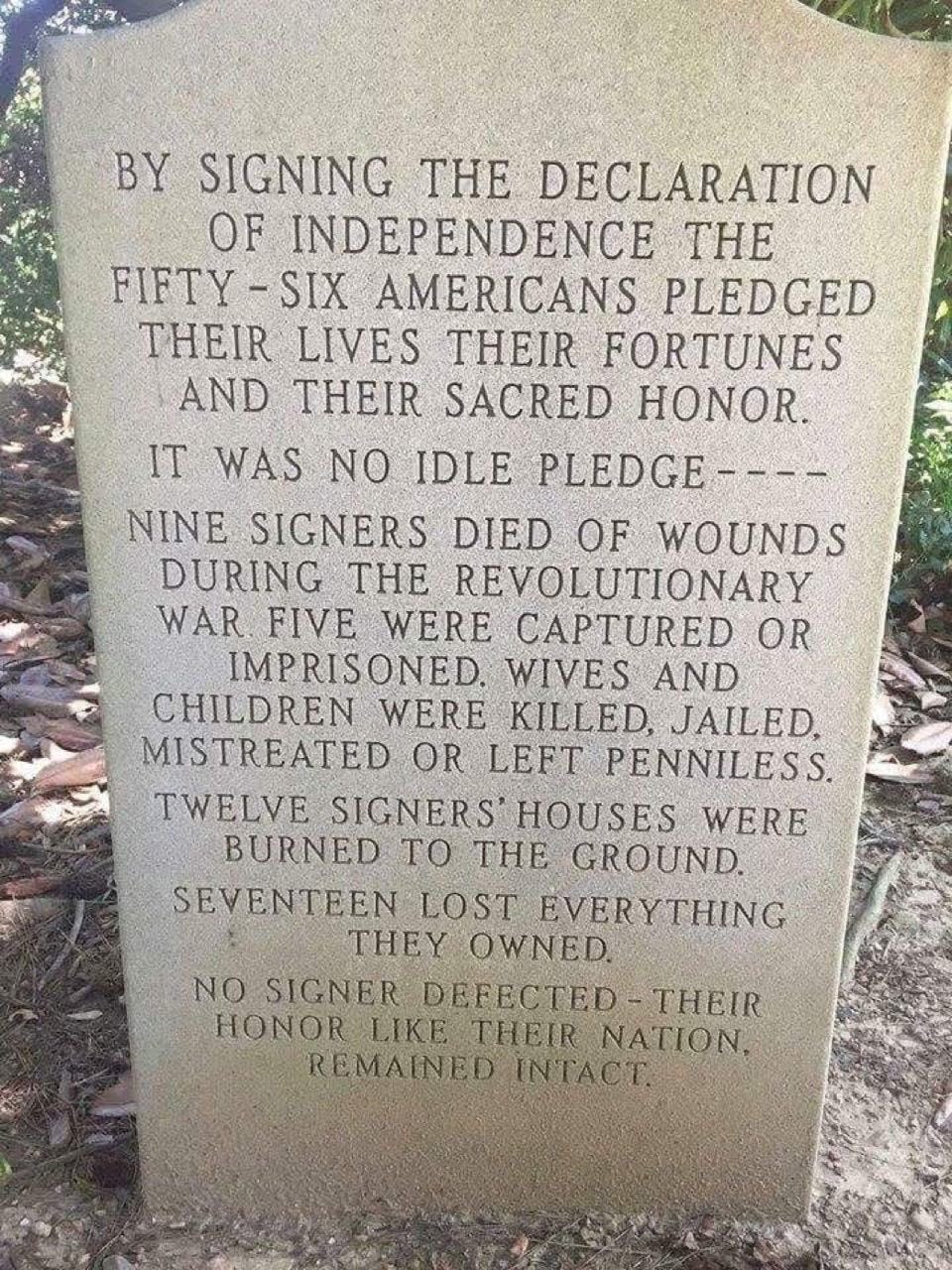Independence Day is a federal holiday in the United States, commemorating the Declaration of Independence, which was ratified by the Second Continental Congress on July 4, 1776, establishing the United States of America.
In the early 1770s, more and more colonists became convinced that the British Parliament intended to take away their freedom. Colonists elected delegates to form a Continental Congress to discuss the possibility of reconciliation with the Crown. By late in 1775, the delegates had given up hope of reunification as the King had declared the colonists to be in a state of open rebellion.
On June 7, 1776, Richard Henry Lee introduced a resolution “that these united colonies are and of right ought to be free and independent states,” acting under the instruction of the Virginia Convention. The Lee Resolution was the following:
Be It Resolved, that these United Colonies are, and of right ought to be, free and independent States, that they are absolved from all allegiance to the British Crown, and that all political connection between them and the State of Great Britain is, and ought to be, totally dissolved.
That it is expedient forthwith to take the most effectual measures for forming foreign Alliances. That a plan of confederation be prepared and transmitted to the respective Colonies for their consideration and approbation
The Congress voted to pass the Lee Resolution on July 2 and adopted the Declaration of Independence two days later, on July 4.
According to Wikipedia,
On Independence Day, fireworks are often accompanied by patriotic songs, such as “The Star-Spangled Banner” (the American national anthem); “Columbia, the Gem of the Ocean”; “God Bless America”; “America the Beautiful”; “My Country, ‘Tis of Thee”; “This Land Is Your Land”; “Stars and Stripes Forever”; “Yankee Doodle.”
Delegate John Adams wrote to his wife Abigail: (emphasis mine)
The second day of July 1776 will be the most memorable epoch in the history of America. I am apt to believe that it will be celebrated by succeeding generations as the great anniversary festival. It ought to be commemorated as the day of deliverance, by solemn acts of devotion to God Almighty. It ought to be solemnized with pomp and parade, with shows, games, sports, guns, bells, bonfires, and illuminations, from one end of this continent to the other, from this time forward forever more.
How soon we forget?
And here we are, 249 years later.
Do we celebrate this holiday with ‘solemn acts of devotion to God’? Do you – or your children or your grandchildren – know the lyrics to the above-mentioned patriotic songs? Do we still honor this day as a ‘day of deliverance,’ or do we just look at it as a day off to spend time working in the yard or to have a barbecue with family and friends?
The 56 delegates of the Continental Congress pledged to each other, “our lives, our fortunes and our sacred honor” when they took the daring step of revolt against King George. And, if you know their history, they lost everything to create this country. Some even lost their life.
They believed in freedom. They believed God had given this new country unalienable rights, including the right to life, liberty, and the pursuit of happiness.
Our rights are enshrined in the first 10 Amendments to the Constitution, called the Bill of Rights, which guarantees the civil rights and liberties enjoyed today by all individuals. We are most familiar with the First Amendment these days:
The First Amendment protects the right to express ideas through free speech and a free press; the right to assemble or gather with a group to protest or for other reasons; and the right to ask the government to fix problems. It also protects the right to religious beliefs and practices and prevents the government from creating or favoring a religion.
The Bill of Rights sets the rules for due process of law, for search and seizure of property, for the right to bear arms, and more. In honor of our Independence and our God-given, unalienable rights, today is a good time to review all 10 Amendments. You can find them here.
What are ‘unalienable’ rights?
Unalienable is an adjective that means “not transferable to another” or “not capable of being taken away or denied.”
The definition reminds us today that our rights, as established within the Declaration of Independence, cannot be taken away by dictatorial tyrants on a global level or by our elected officials. We need to understand the power of our freedoms and embrace them in everything we do. We need to rebuke all those within our society and our government who trample our Constitution, claiming it is outdated and needs to be revised. What better governing document could be created than the one we have, the one that gives us freedoms that cannot be taken away or denied?
The Bible and Our Constitution
Most are unaware of the role the Bible played in the founding of our nation. The commitment to the Bible by our Founding Fathers was unwavering. We cannot read the history of our nation without acknowledging the role the Bible played in shaping our Republic.
In fact, one of the first acts of the newly formed American Congress was to throw out the long-standing British policy that forbade the Bible from being printed in English in America. On September 12, 1782, the first Bibles were printed and came with a “Congressional endorsement and recommendation” for inhabitants of the United States. Many of our presidents acknowledge the Bible’s imprint on our founding documents. For example:
In 1864, President Abraham Lincoln said:
“The Bible is the best gift God has given to men. All the good the Savior gave to the world was communicated through this Book. But for it, we could not know right from wrong.”
In 1901, President Teddy Roosevelt said:
“The teachings of the Bible are so interwoven and entwined with our whole civic and social life what it would be literally – I do not mean figuratively; I mean literally – impossible for us to figure what life would be [like] if these teachings were removed. We would lose almost all the standards by which we now judge both public and private morals. [We would lose] all the standards toward which we, with more or less resolution, strive to raise ourselves.
Almost every man who has by his life-work added to the sum of human achievement of which the race is proud – of which our people are proud – almost every such man was based his life-work largely upon the teachings of the Bible.”
In 1950, President Harry Truman said:
“The fundamental basis of this Nation’s laws was given to Moss on the Mount. The fundamental basis of our Bill of Rights comes from the teachings which we get from Exodus and St. Matthew, from Isaiah and St. Paul. I don’t thing we emphasize that enough these days.
In 1983, President Ronald Reagan said:
“The Bible and its teachings helped form the basis for the Founding Fathers’ abiding belief in the inalienable rights of the individual – rights which they found implicit in the Bible’s teachings, of the inherent worth and dignity of each individual.”
If you want a real history lesson, interwoven with the Word of God, I strongly encourage you to add The Founders’ Bible to your collection. Interwoven within the biblical text are original stories, letters, and memos from and about the men who shaped the history of our Nation. With thousands of references, footnotes, and archival-quality illustrations, The Founders’ Bible is a must-have in every household. You will thoroughly enjoy reading how God and the story of America are intertwined. Knowing the history of why America is God’s country gives us courage and strengthens our resolve to re-establish our moral compass.
America is worth fighting for.
The Bible as the Christian’s Constitution
As a Christian, the Bible gives us similar, but even more powerful, ‘unalienable rights,’ rights that cannot be taken away or denied.
If you have received the free gift given to us through belief in Jesus Christ, you can be certain of these unalienable rights: (adopted from GrowInGrace.com)
You are forgiven.
“When you were dead in your sins and in the uncircumcision of your flesh (worldliness, manner of living), God made you alive together with Christ, having [freely] forgiven us all our sins.” (Colossians 2:13; Amplified)
You are a child of God.
“But as many as received him, to them gave he the right to be children of God, even to those that believe on his name;” (John 1:12; KJV)
You are saved for eternity.
“Truly, truly, I say to you, the one who hears My word, and believes Him who sent Me, has eternal life, and does not come into judgment, but has passed out of death into life.” (John 5:24; NASB)
You have peace.
“I have said these things to you, that in Me you may have peace. In the world you will have tribulation. But take heart; I have overcome the world.” (John 16:33; ESV)
These things establish your eternal, unalienable position with God. However, at any given time, your present spiritual condition depends on your practical obedience to His Word.
As we do our “thing” this weekend, let’s remember the real reason for the holiday. Let’s do what John Adams predicted: commemorate July 4th as the day of deliverance by solemn acts of devotion to God Almighty.
At the same time, let’s celebrate the unalienable eternal life given to us by God through belief in Jesus Christ.
July is EYE HEALTH month for Tenpenny Prime Members! Join Now!
Click this link for the original source of this article.
Author: Dr. Sherri Tenpenny
This content is courtesy of, and owned and copyrighted by, https://drtenpenny.substack.com and its author. This content is made available by use of the public RSS feed offered by the host site and is used for educational purposes only. If you are the author or represent the host site and would like this content removed now and in the future, please contact USSANews.com using the email address in the Contact page found in the website menu.













